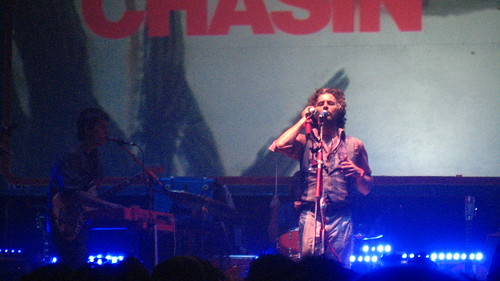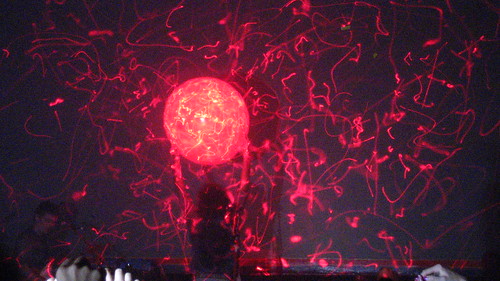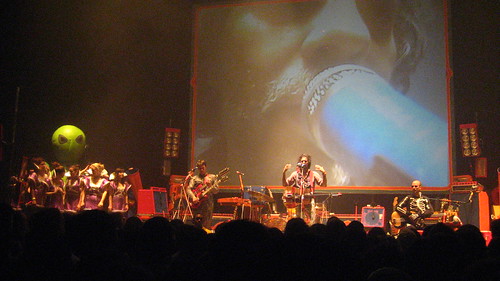The premise of the show is basically Unbreakable on a large scale, so it's a premise that's targetted right towards people like me, fans of genre fiction, particularly superhero stuff. If this was a comic, it wouldn't be a particularly original thing, Rising Stars has basically the same premise. But, this is being done on TV, so we get some novelty due to the new medium. Due to the subject matter, I'm giving this one a pretty big margin for error, and after the pilot I'm intrigued, but not totally sold.
The opening sets this out as an epic story, with the pretentious opening scroll and the first episode's title, 'Genesis.' I love the idea of a show that's conceived as one large story, the series reminds me a bit of Carnivale in that respect, even if you're not hooked on the characters and plot immediately, there's the promise of something important if you stick around. From there we get to the recurring image of the pilot, Milo Ventimiglia's Peter leaping off a tall building. A lot of times these striking images designed to hook the viewer don't work so well, witness a lot of Alias episodes. But, here it's effective, partially due to the really convincing visual effects.
The pilot is clearly inspired by Lost's mix of various ethnic characters with loose connections between them. However, it winds up playing more like a Robert Altman film, as a bunch of seemingly unrelated characters move through their lives, sometimes crossing each other, sometimes not. The unifying event, in this case an eclipse, is right out of Short Cuts. However, the talent here isn't quite at Altman level, what Altman and PT Anderson do is keep a feeling of unity through the multiple story threads, so even if we're hopping from character to character, it's one emotional arc progressing. Here, it's a bit more haphazard, but that's understandable in a TV pilot. The demands of this are quite different from Nashville, which worked as a standalone piece. As they keep emphasizing, this is merely the first part of a larger story.
Breaking out the individual stories, the most fun is definitely Hiro, the Japanese office worker struggling to transcend the space/time barrier. There's a lot of humor here, a contrast to the sometimes so serious it becomes absurd rest of the show. I always love heavy drama, but in a pilot, particularly one with a supernatural bent, it's important to have a sense of humor about your concepts. I think the Buffy model is perfect in the way it brings you into the world with humor, then allows things to become more serious once you're aware of the rules. I think this show generally pulls things off, but all the characters behave like they're in a world where this stuff is normal, and that takes away a lot of the potential fun of the piece. Unbreakable was as self-serious a film as you'll encounter, but there are moments that allowed Bruce Willis' character to revel in his powers, and I'd like to see that beyond just Hiro.
That said, the generally serious treatment of Claire, the cheerleader's, story works well. Here, the powers are wrapped up in an adolescent fear of being shunned by both her family and her school. She's someone who might revel in her potential once she learns to come to terms with her powers. Her story works on an emotional level, and that's what ultimately sells things. If we can understand the characters' motivations, if they feel real, then we can accept the sci-fi conceits.
Despite good associations from Gilmore Girls, I thought Milo Ventimiglia's segment was generally the weakest of the episode. The problem was his brother didn't behave like someone who's just been told that his brother thinks he can fly. Rather, they behaved like people who already knew they were in a piece of genre fiction. Now, you could argue that Nathan didn't treat this as ridiculous because he knew about his own powers, but I'm not so sure that sells. The revelation at the end was good in theory, but a bit marred by the fact that the effects didn't quite sell it. There was some pretty weak bluescreen work in there. But, it still worked on a conceptual level and was a strong cliffhanger to bring things back for episode two.
Watching the pilot what really stands out is the potential. Grant Morrison uses superhero fiction as a way to explore the potential of the human race, and our ultimate evolutionary destiny. In the stuff with Mohinder we get some of these concepts, and a tease for what the series could become. If things work out, the show could explore what the next stage of human evolution would mean for our society, both as a collective, and for individuals. There's clearly some conservative forces at work who would rather not see humanity beyond its current limitations.
I think that's the inherent appeal of the superhero concept, the idea that within us there's the potential for something greater, and that one day, we will acheive that potential and exert total control over the world we're in. And putting that noble aspiration in conflict with the worst aspects of human nature has the potential for incredible drama.
From a filmmaking standpoint, the show looks fantastic. With the exception of the shoddy effects work at the end, everything looks big, giving the show the epic feel the opening portended. The strongest visual moment is the eclipse section, which does a nice job of uniting all the characters. The episode is very dense, but I got a good idea of all the characters. At times, the dialogue lapsed into filmspeak, but I think these are all just kinks that have to be worked out as the creators find the characters' voices.
The first episode ends with things up in the air. The apparent destiny of the show is some kind of apocalyptic event in New York. Again stirring up memories of Carnivale, it seems that our select group must band together to combat this prophesized evil and save humanity.
I may sound a bit harsh on this pilot, it's got its flaws, but on the whole I really liked it and I'm optimistic about the show's future. It's always very difficult to do a first episode, and this one did its job of getting me to watch the next one. I'm not sure if the show will fulfill the promise of this episode, but I'll be intrigued to see it try.






